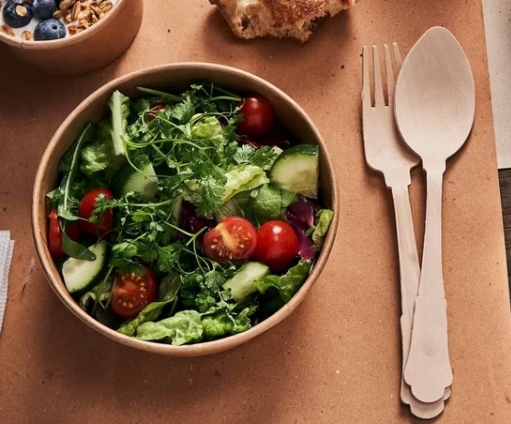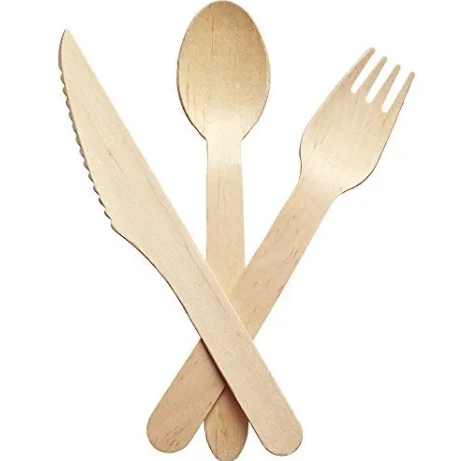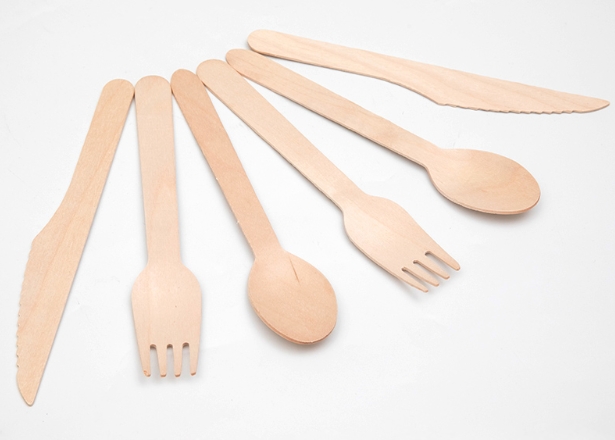
Content Menu
● Understanding Wooden Disposable Knife, Fork, and Spoon Sets
● Heat Resistance: Can Wooden Disposable Cutlery Handle Hot Foods?
>> The Natural Heat Resistance of Wood
>> Thickness and Quality Matter
>> No Risk of Chemical Leaching
● Moisture Absorption and Durability
>> How Wood Reacts to Hot, Moist Foods
>> Best Practices for Use
● Types of Wood Used in Disposable Cutlery
>> Birch Wood
>> Bamboo
>> Maple and Other Hardwoods
● Safety Considerations: Coatings and Treatments
>> Importance of Food-Safe Finishes
>> Avoiding Splinters and Rough Edges
● Environmental Impact: Why Choose Wooden Disposable Cutlery?
>> Biodegradable and Compostable
>> Renewable Resources
>> Reduced Pollution and Waste
● Practical Applications: When to Use Wooden Disposable Cutlery
>> Events and Catering
>> Takeout and Delivery
>> Everyday Use
● Limitations and Considerations
>> Not Suitable for Prolonged Soaking
>> Strength and Cutting Ability
>> Taste and Odor
● Choosing the Best Wooden Disposable Knife, Fork, and Spoon Sets
● Conclusion
● Frequently Asked Questions (FAQ)
>> 1. Can wooden disposable knife, fork, and spoon sets be reused?
>> 2. Are wooden disposable knife, fork, and spoon sets safe for children?
>> 3. Do wooden disposable knife, fork, and spoon sets impart a taste to food?
>> 4. Are wooden disposable knife, fork, and spoon sets compostable at home?
>> 5. Can wooden disposable knife, fork, and spoon sets be used with acidic or oily foods?
As the global push for sustainability continues to grow, more people are seeking eco-friendly alternatives for everyday products. Among these, wooden disposable knife, fork, and spoon sets have emerged as a popular choice for events, catering, restaurants, and takeout services. However, a common question arises: Can wooden disposable knife, fork, and spoon sets be used for hot foods? This article delves into the properties of wooden cutlery, examines its suitability for hot foods, and offers practical advice for safe and effective use.

Understanding Wooden Disposable Knife, Fork, and Spoon Sets
Wooden disposable cutlery is typically crafted from renewable resources such as birch wood, bamboo, or maple. These materials are selected for their strength, durability, and environmental benefits. Unlike plastic utensils, which contribute to landfill waste and environmental pollution, wooden cutlery is biodegradable and compostable, making it a responsible choice for eco-conscious individuals and businesses.
The manufacturing process for wooden disposable knife, fork, and spoon sets involves selecting high-quality wood, shaping it into utensils, and smoothing the surfaces to ensure safety and comfort. The result is a set of utensils that not only looks natural and elegant but also performs well in a wide variety of dining situations.
Heat Resistance: Can Wooden Disposable Cutlery Handle Hot Foods?
The Natural Heat Resistance of Wood
One of the most significant advantages of wooden disposable knife, fork, and spoon sets is their natural resistance to heat. Wood does not melt or deform when exposed to high temperatures, which sets it apart from many plastic alternatives that can soften, warp, or even release harmful chemicals when used with hot foods.
Wooden spoons, forks, and knives are designed to maintain their shape and integrity even when used with hot dishes such as soups, stews, pasta, and grilled foods. This makes them a practical choice for both hot and cold meals, whether you are hosting a backyard barbecue, a catered event, or enjoying a takeout meal at home.
Thickness and Quality Matter
The ability of wooden disposable cutlery to withstand heat is influenced by the thickness and quality of the wood used. Thicker utensils are less likely to warp or break under high temperatures. High-quality wooden disposable knife, fork, and spoon sets are typically made from sturdy woods like birch or bamboo, which offer both durability and heat resistance.
No Risk of Chemical Leaching
Unlike plastic cutlery, which can leach chemicals into hot foods, wooden disposable knife, fork, and spoon sets are free from synthetic toxins. As long as the cutlery is untreated or coated with food-safe finishes, there is no risk of harmful substances migrating into your food when exposed to heat. This makes wooden cutlery a safer option for health-conscious individuals and families.
Moisture Absorption and Durability
How Wood Reacts to Hot, Moist Foods
While wooden disposable knife, fork, and spoon sets are heat-resistant, it is important to note that wood is a porous material. This means it can absorb moisture from hot, liquid-rich foods. If the utensils are left in hot soups or stews for an extended period, they may begin to soften or warp slightly. However, for most typical dining situations, such as eating a hot meal over the course of twenty to thirty minutes, wooden cutlery performs reliably and maintains its structure.
Best Practices for Use
To maximize the durability of wooden disposable cutlery with hot foods:
- Avoid leaving utensils submerged in hot liquids for long periods.
- Use thicker, high-quality wooden cutlery for dishes that are especially hot or oily.
- Dry the utensils promptly after use if you plan to reuse them (some bamboo cutlery can be rinsed and reused for a second meal).
Types of Wood Used in Disposable Cutlery
Birch Wood
Birch wood is a popular choice for disposable knife, fork, and spoon sets due to its strength, smooth texture, and natural resistance to heat. Birch is also biodegradable and compostable, making it environmentally friendly.
Bamboo
Bamboo is another excellent material for wooden disposable cutlery. It is naturally strong, flexible, and highly resistant to both heat and moisture. Bamboo grows rapidly and requires minimal resources to cultivate, making it one of the most sustainable options available.
Maple and Other Hardwoods
Some manufacturers use maple or other hardwoods for their cutlery. These woods are also durable and heat-resistant, though they may be less common than birch or bamboo.
Safety Considerations: Coatings and Treatments
Importance of Food-Safe Finishes
When selecting wooden disposable knife, fork, and spoon sets, it is essential to ensure that any coatings or finishes used are food-safe and non-toxic. Some products may be treated with lacquers, varnishes, or stains to enhance appearance or durability. However, certain finishes can contain chemicals that may leach into food, especially when exposed to heat. Always choose cutlery from reputable brands that clearly state their products are free from harmful substances.
Avoiding Splinters and Rough Edges
High-quality wooden disposable cutlery undergoes careful sanding and finishing to eliminate splinters and rough edges. This ensures a pleasant dining experience and reduces the risk of injury or discomfort.

Environmental Impact: Why Choose Wooden Disposable Cutlery?
Biodegradable and Compostable
One of the primary reasons for the popularity of wooden disposable knife, fork, and spoon sets is their minimal environmental footprint. Unlike plastic utensils, which can take centuries to decompose, wooden cutlery breaks down naturally in compost piles or landfills. Many products are also certified compostable, meaning they can be safely added to home or commercial compost systems.
Renewable Resources
Wooden disposable cutlery is made from renewable resources like birch and bamboo. These materials can be harvested sustainably, ensuring that the production process does not deplete natural ecosystems.
Reduced Pollution and Waste
By choosing wooden disposable knife, fork, and spoon sets over plastic alternatives, consumers and businesses help reduce plastic pollution and support a cleaner, healthier planet.
Practical Applications: When to Use Wooden Disposable Cutlery
Events and Catering
Wooden disposable cutlery is ideal for weddings, parties, corporate events, and outdoor gatherings. Its natural appearance adds a touch of elegance, while its performance with hot foods ensures guests can enjoy a wide range of dishes.
Takeout and Delivery
Many restaurants and food service providers now offer wooden disposable knife, fork, and spoon sets with takeout and delivery orders. This not only appeals to eco-conscious customers but also provides a reliable utensil for enjoying hot meals on the go.
Everyday Use
For picnics, camping trips, or even daily lunches, wooden disposable cutlery offers a convenient and sustainable alternative to traditional utensils.
Limitations and Considerations
Not Suitable for Prolonged Soaking
While wooden disposable knife, fork, and spoon sets can handle hot foods, they are not designed for prolonged soaking in hot liquids. If you need to leave utensils in a pot of soup or stew for an extended period, stainless steel or other reusable options may be more appropriate.
Strength and Cutting Ability
Wooden knives are generally effective for cutting softer foods but may struggle with very tough or dense items. For most typical meals, however, they perform adequately.
Taste and Odor
High-quality wooden disposable cutlery is carefully processed to eliminate any wood taste or odor. However, very sensitive individuals may notice a slight natural aroma, especially with bamboo products.
Choosing the Best Wooden Disposable Knife, Fork, and Spoon Sets
When selecting wooden disposable cutlery for hot foods, consider the following:
- Material: Choose birch or bamboo for optimal strength and heat resistance.
- Thickness: Thicker utensils provide better durability and performance.
- Finish: Look for food-safe, non-toxic finishes.
- Brand Reputation: Opt for reputable brands that prioritize quality and sustainability.
- Certifications: Compostable and biodegradable certifications ensure environmental responsibility.
Conclusion
Wooden disposable knife, fork, and spoon sets are a practical, sustainable, and safe choice for enjoying hot foods. Their natural heat resistance, absence of harmful chemicals, and environmental benefits make them an excellent alternative to plastic cutlery. While they are not intended for prolonged soaking in hot liquids or cutting extremely tough foods, they perform admirably in most dining situations. By choosing high-quality wooden disposable cutlery, consumers can enjoy their meals with peace of mind, knowing they are making a positive impact on both their health and the planet.

Frequently Asked Questions (FAQ)
1. Can wooden disposable knife, fork, and spoon sets be reused?
High-quality wooden disposable cutlery, especially those made from bamboo, can sometimes be rinsed and reused for a second meal if they are not overly soiled or damaged. However, they are primarily designed for single use to maintain hygiene and convenience.
2. Are wooden disposable knife, fork, and spoon sets safe for children?
Yes, wooden disposable cutlery is generally safe for children, provided it is free from splinters and rough edges. Always supervise young children when using any type of cutlery to prevent accidental injury.
3. Do wooden disposable knife, fork, and spoon sets impart a taste to food?
Most high-quality wooden disposable cutlery is processed to eliminate any noticeable wood taste or odor. However, some individuals with sensitive palates may detect a slight natural aroma, particularly with bamboo utensils.
4. Are wooden disposable knife, fork, and spoon sets compostable at home?
Many wooden disposable cutlery products are compostable and can be added to home compost piles along with other organic waste. Check the packaging for compostability certifications to ensure proper disposal.
5. Can wooden disposable knife, fork, and spoon sets be used with acidic or oily foods?
Wooden disposable cutlery can be used with most types of food, including acidic or oily dishes. However, prolonged exposure to very oily or greasy foods may cause the utensils to soften or warp over time. For best results, use thicker, high-quality cutlery and avoid leaving utensils in food for extended periods.

















